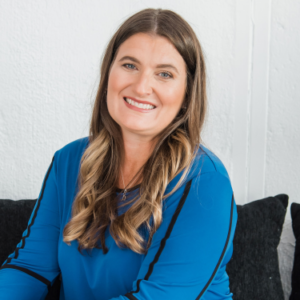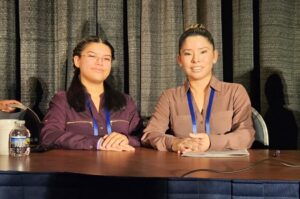WASHINGTON, D.C.—Doctors and patient advocates urged the rheumatology community to address the drastic inadequacies in care faced by marginalized people in a session titled Cultural Humility for the Pediatric Rheumatologist held at ACR Convergence 2024.
Confronting Bias

Dr. Rose-Smith
Jillian Rose-Smith, PhD, MPH, MSW, introduced cultural humility as an approach that “not only addresses the medical condition but also takes into account the structural barriers a patient may face.” She said cultural humility encourages clinicians to proactively address these issues by offering language assistance, helping with social services and taking other steps to make care more accessible to underserved communities.
Dr. Rose-Smith speaks from experience as a vice president and chief health equity officer at the Hospital for Special Surgery, New York, where she has implemented hospital-wide initiatives, including training for all employees, the development of appropriate tools and evaluation processes and collaboration with various department leadership. They have researched and implemented quality initiatives to identify and address health disparities.
According to Dr. Rose-Smith, “71% of patients who are minorities report incomes below the poverty line.” This sobering fact emphasizes just how steep and pervasive financial barriers to care are for many patients.
She emphasized the importance of avoiding assumptions and generalizations about patients, and instead listening directly to patients and their families. She provided a few example scenarios of reasons why patients may not seek treatment, such as fear of persecution based on immigration status.
Dr. Rose-Smith closed by urging practitioners to “question your own bias, initiate the hard conversations, learn and unlearn.”
Patients & Their Parents Speak Out

Shiloh Kantz
The next speaker, Shiloh Kantz, is the executive director at Oklahoma Policy Institute, a non-partisan nonprofit. She is also the mother of a pediatric rheumatology patient. At 9 years old, Ms. Kantz’s daughter was diagnosed with polyarticular juvenile idiopathic arthritis and later received an updated diagnosis of systemic sclerosis. When her daughter’s pediatric rheumatologist left Oklahoma, 378 patients were suddenly left without access to a pediatric rheumatologist. Ms. Kantz said she had no choice but to drive eight hours to Dallas to ensure her daughter received the care she needs.
There are few resources for parents of kids with scleroderma, and Ms. Kantz recommended that rheumatology professionals provide basic FAQs to help parents of patients “absorb the shock from these life changing events.”
Ms. Kantz also attested to the steep financial burdens that parents of pediatric rheumatology patients face. After her daughter required three tests one week, Ms. Kantz was billed $3,700 in copays. “We cannot rely on philanthropy” to help the families of children with rheumatic disease meet their basic requirements so they don’t have to choose between feeding their family and filling a prescription for their child with rheumatic disease, she said. “Are you ready to get uncomfortable with me? Our kids and families depend on us.”

Miah Andrade (left) and her mother, Elizabeth SantaCruz; Photo courtesy Lupus and Allied Diseases Association Inc.
Miah Andrade is a young patient advocate for the Lupus and Allied Diseases Association Inc., Kearny, N.J. She has been making waves in the lupus community from an early age and made history as the first pediatric patient presenter at the ACR’s annual meeting. Diagnosed with lupus at age 9, she has transformed her journey into a powerful advocacy platform.
Miah’s symptoms began at age 6, but her diagnosis was delayed, a point both Miah and her mother emphasized. They said medical professionals initially ignored and dismissed Miah’s symptoms, including photosensitivity, “excruciating” joint pain (dismissed as “growing pains”) lupus fog and cognitive difficulties, due to age bias, race and language barriers.
Miah’s mother, Elizabeth SantaCruz, also an advocate for the Lupus and Allied Diseases Association Inc. and director of outreach and communication for LupusChat, told what is, unfortunately, a common story. The family faced numerous challenges while seeking a diagnosis and appropriate medical care for her daughter. In addition to the delayed diagnosis, Ms. SantaCruz talked about the difficulties imposed by the pediatric rheumatologist shortage, insurance complications and financial stress. She and her husband did anything they could to find a doctor who could diagnose and treat Miah, including working multiple jobs so they could get a better health plan. They even contemplated selling their home.
Despite these obstacles, they eventually found a pediatric rheumatologist who understood their concerns and worked with them to create a treatment plan.
Elizabeth fought tirelessly to ensure Miah had the best medical care possible. She realizes that not every parent or family has the ability to do the same. This experience highlights the need for increased diversity in the medical workforce, culturally competent care, improved insurance coverage and better access to language interpretation services. “Give us a voice in our child’s care,” concluded Ms. SantaCruz.
Miah shares her experiences to raise awareness, promote understanding and inspire hope within the lupus community. “Empathy and understanding can bridge gaps,” she said. “Sharing patient stories fosters inclusive care. Together, we overcome barriers.”
From Patient to Provider

Dr. Ugochukwu
The final speaker, Adaobi Ugochukwu, MD, is a pediatric resident at Children’s National Hospital in Washington, D.C., a support group facilitator, ambassador and Lupus Research Action Network member through the Lupus Foundation of America. Dr. Ugochukwu was diagnosed with lupus at age 15, six years after first experiencing symptoms. She hopes to help other pediatric rheumatology patients avoid the hardships she experienced while seeking a diagnosis and treatment.
She spoke of “a lot of dreams deferred or denied” due to lupus, explaining that her symptomatic lupus was why it took her seven years to complete medical school.
Dr. Ugochukwu, who is a Black woman of Nigerian descent, says that as a child, her lupus skin symptoms were misdiagnosed because her doctors weren’t familiar with how lupus can look on a patient with her skin tone. This reveals the necessity of cultivating a rheumatology workforce that is as diverse as the patients it treats.
Dr. Ugochukwu emphasized the need to recruit more rheumatologists to increase access to treatment in rural areas and urged care providers to give patients “the skills to cope with diagnosis” by connecting them with support groups and resources.
“We need to meet patients and parents where they are,” she said.
Speaking as a patient, she said, “Listen to us. Discuss our quality of life. At 19 years old, I wasn’t going to take [massive doses of corticosteroids] that were going to give me moon face. Tell me, ‘Yes, this is going to be tough, but it’s not going to be impossible.’”
Her recommendations include increasing the availability of virtual care to reduce the amount of time patients must travel for treatment and shortening subspecialty training time to draw more people into the field.
In Sum
This session provided a platform for doctors and patients to educate attendees about the difficulties that many marginalized patients and their families face when seeking pediatric rheumatologic care. Cultural humility, the “ongoing process of self-exploration and self-critique in combination with the willingness to learn from others while honoring their beliefs, customs, and values,” is one approach that can be utilized to begin to bridge the gap between patients and practitioners.
By Glen K. Rodman, assistant editor of The Rheumatologist, with Keri Losavio, editor.



